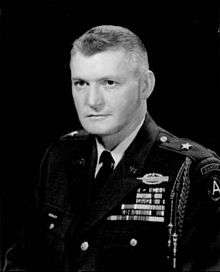John Thomas Corley
| John T. Corley | |
|---|---|
 Brigadier General John T. Corley | |
| Born |
August 4, 1914 Brooklyn, New York |
| Died | April 16, 1977 (aged 62) |
| Allegiance |
|
| Service/branch |
|
| Years of service | 1938-1966 |
| Rank |
|
| Battles/wars |
World War II Korean War |
| Awards |
Distinguished Service Cross (2) Silver Star (8) Soldier's Medal Legion of Merit (2) Bronze Star (4) Purple Heart Combat Infantryman Badge (2) Ranger tab |
Brigadier General John T. Corley (August 4, 1914 - April 16, 1977) was a career Army officer noted for his contributions to Army training.
Early life
Born to Irish immigrant parents in Brooklyn, New York. He attended high school at St. Francis Preparatory High School, in Brooklyn and graduated from the class of 1932 and he is also a member of that High School's Hall of Fame. He graduated from the United States Military Academy at West Point in 1938, where he also was an accomplished boxer prior to his active duty service. One story states that after his graduation from West Point he was assigned to the Army Air Corps; where he then flew an airplane under the Brooklyn Bridge and was then reassigned to the infantry.
World War II
He fought in World War II with the 1st Infantry Division. As a major, he landed with the Big Red One in North Africa and two days later earned a Silver Star, America's third highest award for valor, for action in Oran, Algeria. In March 1943, during fighting at El Guettar, Tunisia, he destroyed an enemy machine gun nest, allowing his troops to take the hilltop. This action earned Corley the Distinguished Service Cross, America's second highest award for valor. In May 1943 Corley was promoted to Lieutenant Colonel, just five years after graduating from West Point.
While commanding the 3rd Battalion, 26th Infantry Regiment, in Mateur, Tunisia, Corley was wounded. He recovered and went on to fight at the front in Sicily. He landed at Normandy during D-Day and fought at the Hurtgen Forest during late 1944. He also accepted the first unconditional surrender of a German city during the war, when he accepted the surrender of Aachen by Col. Gerhard Wilck.
Corley would add 4 oak leaf clusters to his Silver Star for a total of five Silver Stars earned in World War II. After the war, Corley served in a supporting role at the Nuremberg Trials. He then returned to West Point to teach as a tactical officer, followed by staff positions with the 1st Army, and graduation from the Command and General Staff College at Fort Leavenworth.
Korean War
General Corley was one of 21 commanders personally requested by General Douglas MacArthur for duty in the Far East shortly after the invasion of South Korea by North Korea.
He served as battalion commander of the 24th Infantry Regiment, 25th Infantry Division, a segregated regiment composed of black enlisted men and mostly white officers. Corley led his troops in close combat and earned an oak leaf cluster for his Distinguished Service Cross and three additional clusters for the Silver Star between August and November 1950.
After Korea Corley served as Chief of the Infantry Branch. Following that tour, he graduated from the Army War College at Carlisle Barracks, Pennsylvania in 1954. He would later serve as director of the Infantry School's Ranger Department at Fort Benning, Georgia, and was inducted into the Ranger Hall of Fame in 2003.
Corley would pin on the star of a Brigadier General in July 1962. His last assignment would be as Assistant Division Commander, 2d Infantry Division, Fort Benning, GA. Upon his departure from the US Army Infantry School in June 1960, BG (then COL) Corley was assigned to HQ, US Army Element, SHAPE in Paris with duty in Copenhagen, Denmark with the NATO Land Forces HQ as Deputy Chief of Staff. Upon nomination for promotion to brigadier general, he was reassigned from SHAPE HQ for duty as Assistant Division Commander, 2d Infantry Division, Fort Benning GA. He retired September 30, 1966 and died at the age of 62 on 16 April 1977.
Family
He and his wife, Mrs. Mary Buckley Corley, would have 4 sons and 3 daughters. One son, 1LT John Thomas Corley, Jr., USMA 1967, would be killed in Vietnam. Another son made full Colonel in the Army, and a daughter would serve and retire from the Army Nurse Corps also as a Colonel. HIs son is John F. Corley.
Awards and decorations
 | ||
|
| |
|
| |
|
||
|
| |
|
||
 | ||
Brigadier General Corley’s individual awards and decorations include two Combat Infantryman Badges, two Army Distinguished Service Cross, eight Silver Stars, two Legion of Merit medals, the Soldier's Medal, the Purple Heart an Army Commendation Medal. The American Defense Service Medal, American Campaign Medal, European-African-Middle Eastern Campaign Medal with 2 campaign stars and an arrow, the World War II Victory Medal, Army of Occupation Medal with “Germany” clasp, two National Defense Service Medals, the Korean Service Medal with two campaign stars, the WWII French Croix De Guerre Medal with silver stars, for those who had been mentioned at the division level, the United Nations Service Medal and the Republic of Korea Korean War Service Medal (Posthumously), and the Ranger Tab. He also has the a Korean Presidential Unit Citation for the defense of the port of Pusan, Korea in 1950
See also
References
- National Infantry Museum General John T. Corley - Cases 224, 223
- National Infantry Museum General John T. Corley - Case 225
General John T. Corley - Cases 224, 223